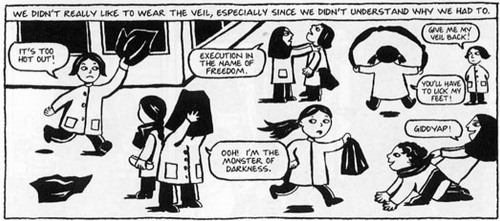Persepolis by Marjane Satrapi is an autobiographical comic book that follows the journey of its author, Marjane, as she grows up in Iran during the Islamic revolution in the 80s and 90s. A powerful coming-of-age tale, the book is both comical and affecting as it takes us through one of the most transformative times in Iran. Persepolis, which is banned in Iran and often seen on many banned books lists in America, is unwavering in its narrative and makes no attempt to diminish the violence that once again dominates Iran. The book is now more important than ever as the current human rights protests in Iran remind us that the people of Iran are still fighting for their rights and humanity, just as Marjane did 40 years ago.
A 22-year-old Kurdish woman, Mahsa Amini, was killed by the morality police in Iran due to “improper hijab” on September 16th. However, instead of becoming another casualty of the Islamic regime, Mahsa became the driving force behind protests all over Iran. In the TIME article “With Regime Strongholds Joining Protests, Iran’s Leaders Appear Nervous” Karl Vick reveals that “protesters appear to be united in opposition to a regime that over four decades in power has grown more isolated and oppressive, especially toward women.” The Iranian people have decided they will no longer continue to suffer while those in power use religion as an excuse to motivate their agenda of oppression over the people of Iran.
Persepolis allows younger audiences who might not understand the severity and history behind the conflict in Iran to understand how the people of Iran have been affected by the oppressive regime for the past four decades. The book follows Marjane, who is 10 years old at the time, as the former Shah of Iran is overthrown and replaced by the current Islamic regime. The young Marjane, despite not being a Muslim, is forced to wear a veil in public along with the rest of the women of Iran. The book does not shy away from mentioning the brutal misogyny, violence, and executions Marjane witnesses in these formative years. One of the most haunting moments of her life occurs when her beloved uncle Anoosh is sent to jail under suspicion of being a Russian spy. In the next chapter, Marjane tells readers that her uncle Anoosh was someone she was always fascinated by and was one of the closest people in her life. He requests to meet with Marjane and tells her that she is the daughter he always wanted. He is executed the next day.

Marjane does not hide any of her experiences and, as a result, the audience is able to understand the trauma and pain that she, along with so many other Iranians, have gone through. As Marjane grows up she is able to see the hypocrisy of the government and does not shy away from using her voice. Her feelings about the cruelty she sees around her reflect what many Iranian people have come to feel today. She says, “I wanted to be justice, love, and the wrath of God all in one.” This powerful statement captures the frustration and pain one feels after seeing their country and people controlled by those who have no love for it.
Marjane Satrapi herself mentions many times that, though she now lives in France, she will always consider herself an Iranian woman. It is no surprise that many Iranians are deeply patriotic, and have love for their country and people which motivates them to go out into the streets and fight for a better future. It gives them the courage to protest, despite several women having already lost their lives protesting in Iran. It is true that there is no bigger force than the love we hold in our hearts, and the women and men of Iran prove that every moment. Satrapi says that “For a revolution to succeed, the entire population must support it.” For the first time in Iran, we see both men and women risking their lives to get justice for Mahsa Amini and the hundreds more who were killed by the corrupt government. The people of Iran who protest today represent the best of Iran and remind the world that, when people come together, they can create a world where the rights of all are respected and implemented by all.
One of the most impactful quotes from Persepolis is said by Marjane’s grandmother who reminds her that “there is nothing worse than bitterness and vengeance…Always keep your dignity and be true to yourself.” It is beautiful advice that captures what it means to be human in times of grave uncertainty. Her statement is also the mighty pulse of every freedom movement that has ever existed. The protests in Iran today are not for vengeance, but for human dignity and equal rights. It is a fight for justice for Mahsa Amini and for every person whose life was unfairly taken from them by those in power. A fight that can only be won by the power of people coming together or, as Marjane would put it, by being “justice, love and the wrath of God all in one.”
Featured photo credit: Taymaz Valley from Ottawa, Canada, CC BY 2.0 <https://creativecommons.org/licenses/by/2.0>, via Wikimedia Commons

